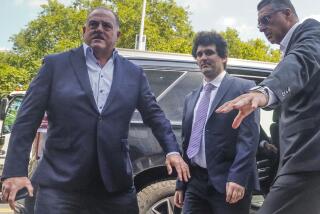Jury Receives Case Against Columbia Savings’ Spiegel : Litigation: His attorney exhorts panel to end government’s eight-year “vendetta” against executive.
- Share via
The much-shrunken federal criminal case against former Columbia Savings & Loan chief Thomas Spiegel went to a jury in Los Angeles Friday afternoon after his defense lawyer exhorted jurors to put a stop to the government’s eight-year “vendetta” against Spiegel.
The jury broke for the weekend around 5 p.m. after a little over an hour of deliberations. It was expected to resume Monday morning.
Only three charges remain from the original 55-count indictment brought against Spiegel in June, 1992, two years after he had been forced to resign from the Beverly Hills-based thrift.
Nine counts were dropped before trial, and the rest have been thrown out by U.S. District Judge Robert M. Takasugi over the course of the seven-week trial.
But the charges that stand are in many ways at the heart of both the government’s case and the defense team’s theory that Spiegel, 48, was a scapegoat for the financial excesses of the 1980s.
The three charges--all felonies--center on Spiegel’s alleged attempt in 1986 to secretly grab for himself a lucrative investment opportunity that grew out of a $2-billion financial deal in which Columbia was a major investor.
Columbia--not Spiegel--deserved that opportunity, Asst. U.S. Atty. Sean Berry said in his 50-minute closing argument. The fact that Spiegel later turned all the gains over to the thrift does not exonerate him from the crimes of defrauding Columbia, taking the investment opportunity as a bribe and lying about it in an official bank document, Berry said.
But defense lawyer Brad D. Brian, in a nearly two-hour closing argument that had some in the packed courtroom gallery brushing back tears, portrayed Spiegel as a scapegoat for incompetent federal regulators who disapproved of his $9-million 1986 paycheck and his brash investment style.
Columbia, holding a huge portfolio of junk bonds in a market that had turned against them, was seized as insolvent in 1991 at a cost to taxpayers estimated at $1.2 billion.
Far from wanting to hurt Columbia, Spiegel was “totally devoted” to the thrift, which was half-owned by his family, Brian said. He worked seven-day weeks to build it into the nation’s most profitable, and had $144 million of his own money invested in it, Brian said.
Columbia thrived in the mid-1980s largely because of Spiegel’s unconventional--some say highly risky--strategy of investing in high-yield, low-rated corporate bonds, called junk bonds. Less glamorous thrifts stuck with safer but low-yielding U.S. government securities.
Some of the junk bonds Columbia bought were issued in takeover deals like Kohlberg Kravis Roberts’ $2-billion leveraged buyout of Storer Communications, which was financed by Michael Milken’s department at Drexel Burnham Lambert.
Columbia invested $86 million in that 1985 deal. Prosecutors say that, as both a reward to Spiegel for being a good customer and an inducement for him to involve the thrift in more deals, Milken personally phoned Spiegel early in 1986 and offered him a chance at a side deal in a partnership that was buying warrants to purchase Storer stock.
Spiegel’s investment of about $130,000 of his own money eventually blossomed into $7 million. Berry said Spiegel didn’t tell Columbia about the deal until he was confronted two years later by Kenneth Heitz, Columbia’s general counsel. Only then did he agree to turn the money over to the thrift, Berry said.
Brian said that Spiegel and other Columbia officers made many such personal investments in deals where Columbia also had an interest. In the Storer case, Spiegel felt the deal was meant for him rather than the thrift and there was no need to report it, Brian said. He also noted that Columbia did not accelerate its investing in Drexel deals after the Storer offer but rather sought ways to slow it.
More to Read
Inside the business of entertainment
The Wide Shot brings you news, analysis and insights on everything from streaming wars to production — and what it all means for the future.
You may occasionally receive promotional content from the Los Angeles Times.










